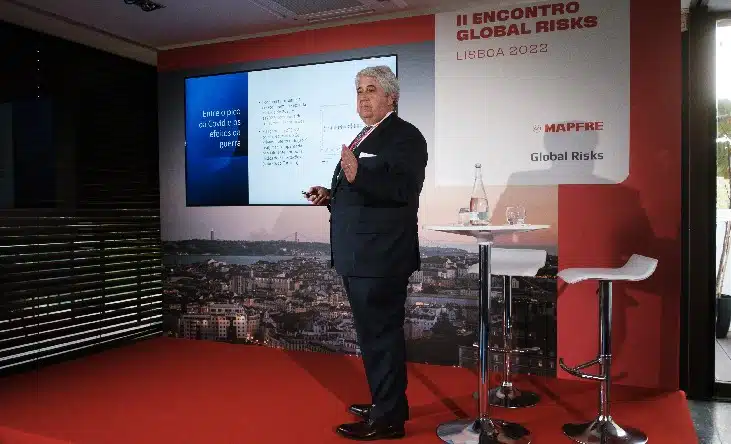ECONOMY| 15.11.2022
Increasing long-term savings is one of the main challenges in facing the issues of aging
António Nogueira Leite is a well-known Portuguese economist and professor of Economics at Universidad Nueva de Lisboa. With extensive experience in the business world, especially in the area of financing, he has been president of the Lisbon Stock Exchange and Secretary of Portuguese Secretary of State of Treasury and Finance. Author of a number of publications, he is currently a member of the board of directors of MAPFRE Seguros Gerais, in addition to holding various leadership positions in other companies.
We took advantage of the opportunity to interview him at the MAPFRE Global Risks conference, held recently in Lisbon, with local and international brokers to analyze the risks and challenges in the medium and long term, in a context of great uncertainty like the current one. He acknowledges that the economic crisis we are experiencing will continue to have a great impact on Europe, with elements we are all aware of (inflation, energy dependency, etc.) that become more important every day, although in this case negatively, and he does not rule out a recession in 2023. However, we set macroeconomic policy aside a bit to focus on other, also pertinent matters that will have a decisive role in the future: the aging of the population and sustainability, for example.
The pension system is one of the pillars of modern society, but it is configured differently in each country. In order to maintain the buying power of retirees, private long-term savings would have to increase. How can this be achieved?
This is one of the main challenges of developed Western societies and, specifically, the Iberian countries. The aging of the population poses significant challenges to the social state, not only in pensions, but also in other areas such as health and care of the elderly. In the case of pensions, the problem is enormous and those countries are aware that having fewer active contributors than retirees will result in the systems offering lower benefits in the coming decades. In the case of Portugal, a person currently retires with an average of 84% of their last salary, but this percentage will be significantly reduced in the future. A 50-year-old person should not expect a public pension higher than 55% of their last salary. In this sense, it becomes necessary to use the available instruments to promote savings. The EU is considering activating a European retirement savings plan, although there would still be space to expand the offering of long-term savings products with adequate risk levels for this type of savings. The financial entities and, specifically, insurance companies, should play an important role here. The budgets of the different countries should also take into consideration those incentives that drive greater savings through tax benefits, and promote the maximum possible stability of the different tax regimens.
Older workers are the most harmed by a labor market that sometimes expels them, precisely because of their age. What can be done to take advantage of that experience and knowledge?
The way companies are organized and the advancement of communications technologies will lead to the need to make ways of existing in the labor market more flexible, as well as the possibility to work part time once retirement age is reached. This latter aspect will become more relevant in the future, as lower pensions than those currently provided are expected (the alternative would be a considerable increase in taxation of younger generations, which is unfair and not viable given the current levels of taxation) and medicine continues to advance, which contributes ever more to people remaining active to older ages if they choose to do so. Additionally, many studies show the benefits to organizations of having people with knowledge and great cumulative experience.

What effects could the digitalization we are currently experiencing have on the economy, and on people?
The digital transformation process we are currently experiencing has already changed our lives, but will do so even more in the future. It will make it easier for us to perform many tasks, both domestic and professional, and will enable a permanent process optimization dynamic, with an impact on organizations and their structures. Part of the competitive future will depend on the success of these changes, so it is important to make an ongoing effort to invest in equipment, networks, programs and people. In addition, the reduction of physical displacement will have an impact on the carbon footprint of our professional and recreational activities.
Today, society values environmental responsibility. Could investment in renewable energies result in notable savings for companies in the future?
Without a doubt. You just have to consider that some global leaders in their sectors, such as Apple or Amazon, among others, have agreements with renewable energy producers so their activities will be based fully on clean energies. As renewable production gains more momentum and becomes more efficient, it is natural that the transition will accelerate to benefit the environment, energy operators, and their corporate clients.
With the invasion of Ukraine, access to energy, such as oil or gas, has been considerably affected and has led to the need to seek alternatives. Do you think that today, access to renewable energy for both companies and individuals is considered a luxury?
It can’t be a luxury. We can’t have renewables only for matters of storage in times when there is no production. I believe that it is possible to move towards a more renewable mix with less CO2 production, taking into account the advances that are being promoted. In addition, the evolution of technology will move in that direction, with the support of governments and the innovation capacity of companies and research centers.
One of the great issues that is ever more concerning is the bet on sustainability. Are economic growth and sustainability at odds, or can they go hand in hand?
I believe they are aligned. Today, we know that the world as we know it depends on our actions and how we defend, or not, the expectations of the societies in which we operate, and the environment in which we move. Currently, leading corporations are aware that their projections maximize long-term value if they incorporate these concerns. Thus, they ensure the backing and trust of their customers and other stakeholders, minimizing business continuity risks, reputational risks, and risks to the value of the respective brands. Economic value without sustainability is ever more ephemeral and inferior to the results of a strategy in which companies value their internal capacities and resources, while caring for the world in which they operate and the society with which they interact.

